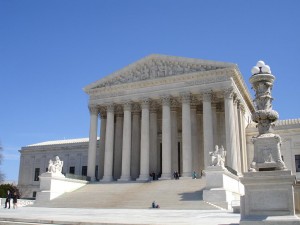Hobbs v. John, U.S. 7th Cir. (7/17/13)
Copyright, Entertainment & Sports Law
 In 1982 Hobbs was working as a photographer on a Russian cruise ship where he had a brief affair with a Russian waitress. Based on the experience, he wrote a song, “Natasha” about an ill-fated romance between a man from the U.K. and a Ukrainian woman. In 1983, he registered his copyright to “Natasha” in the United Kingdom and sent the song to several music publishers, including a company that published songs composed by Elton John and Bernard Taupin. Hobbs’s efforts to find a publisher for “Natasha” were unsuccessful. In 1985, Elton John released his very successful song, “Nikita,” in which a singer from “the west” describes his love for Nikita, whom the singer saw “by the wall” and who is on the other side of a “line” held in by “guns and gates.” Hobbs filed a copyright infringement claim 27 years later. The district court dismissed. The Seventh Circuit affirmed, finding that the songs were not substantially similar. The Copyright Act does not protect general ideas, such as a romance between a western man and a woman from behind the iron curtain, but only the particular expression of an idea.
In 1982 Hobbs was working as a photographer on a Russian cruise ship where he had a brief affair with a Russian waitress. Based on the experience, he wrote a song, “Natasha” about an ill-fated romance between a man from the U.K. and a Ukrainian woman. In 1983, he registered his copyright to “Natasha” in the United Kingdom and sent the song to several music publishers, including a company that published songs composed by Elton John and Bernard Taupin. Hobbs’s efforts to find a publisher for “Natasha” were unsuccessful. In 1985, Elton John released his very successful song, “Nikita,” in which a singer from “the west” describes his love for Nikita, whom the singer saw “by the wall” and who is on the other side of a “line” held in by “guns and gates.” Hobbs filed a copyright infringement claim 27 years later. The district court dismissed. The Seventh Circuit affirmed, finding that the songs were not substantially similar. The Copyright Act does not protect general ideas, such as a romance between a western man and a woman from behind the iron curtain, but only the particular expression of an idea.

 Asiana Airlines announced today that it plans to sue a San Francisco television station for
Asiana Airlines announced today that it plans to sue a San Francisco television station for  The Electronic Privacy Information Center (EPIC)
The Electronic Privacy Information Center (EPIC)  California’s Public Records Act
California’s Public Records Act 
 Back in February, I wrote about the
Back in February, I wrote about the Justia Summary: Since the Court’s 2003 decision,
Justia Summary: Since the Court’s 2003 decision,